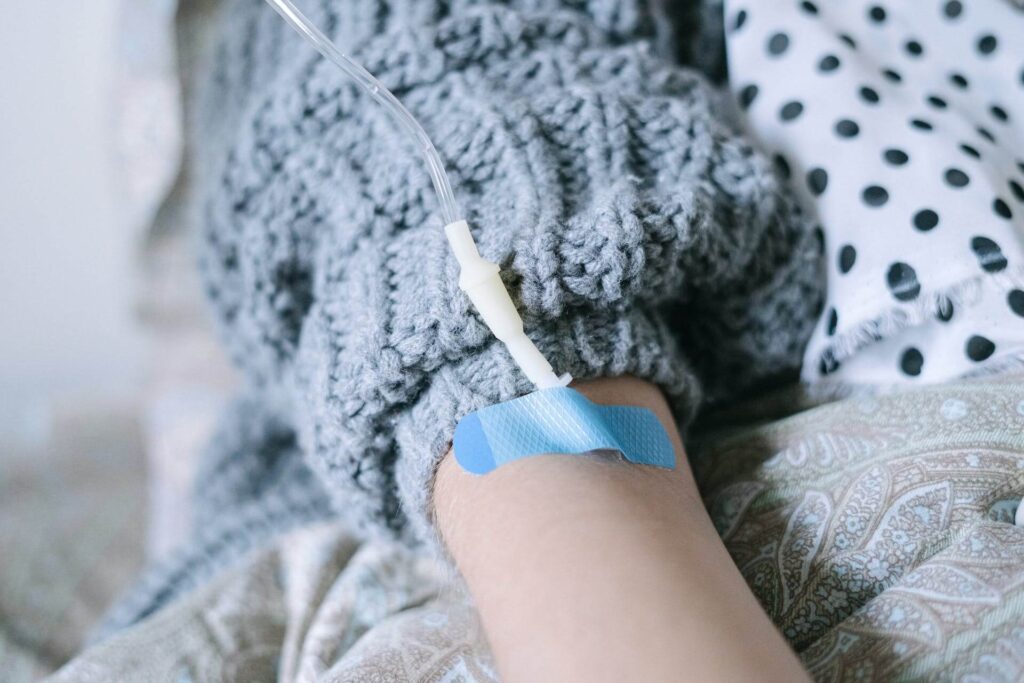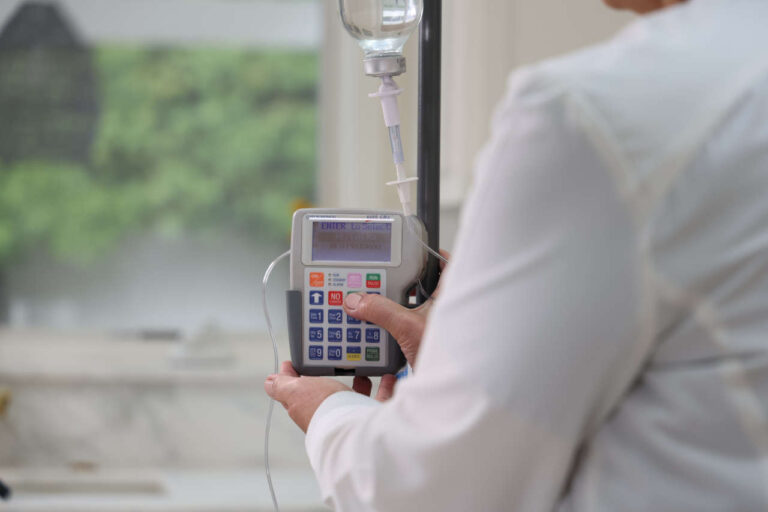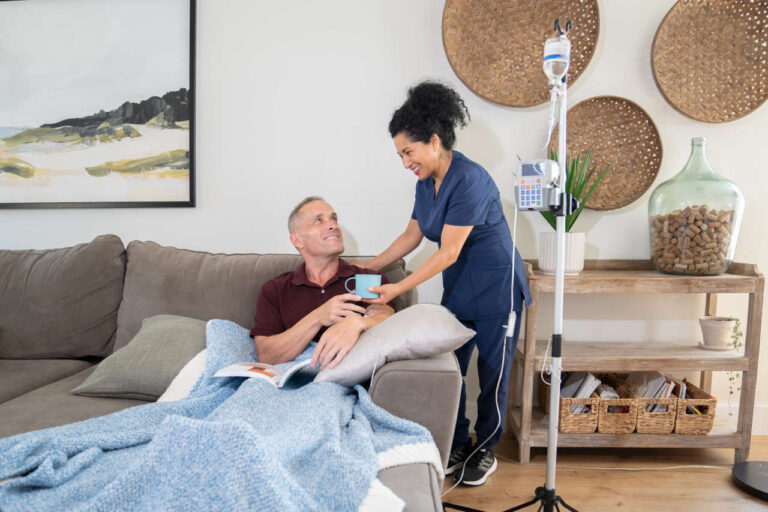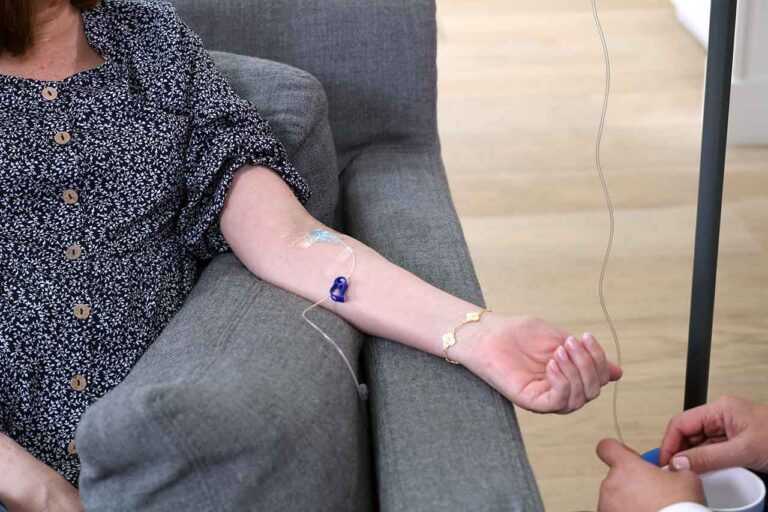
Stiff Person Syndrome (SPS) is a rare neurological disorder characterized by spasms, muscle stiffness, and functional impairment. Although the exact cause is unknown, it’s believed to have autoimmune origins. Treating SPS presents a unique challenge for the medical community as there is no cure, only symptom management.
Get IVIG Prior Authorization
One of the most effective forms of treatment for stiff person syndrome is IVIG. Here, we will explore the potential of IVIG therapy for stiff person syndrome, its mechanism of action, and its effectiveness in reducing associated symptoms.
What Is Stiff Person Syndrome?
Stiff person syndrome is a rare autoimmune neurological disorder that affects one in every million people. It most commonly develops in women between the ages of 40 to 50. However, it can affect anyone at any age.
SPS is often associated with autoimmune disorders such as type 1 diabetes, vitiligo, pernicious anemia, and celiac disease. However, these diseases are not the cause of stiff person syndrome.
What Causes Stiff Person Syndrome?
Scientists don’t know the exact cause of stiff person syndrome, but they suspect it’s an autoimmune disorder. That is why doctors recommend IVIG for those with stiff person syndrome.
An autoimmune disorder is when the body’s immune system attacks healthy cells. Studies show that many patients with SPS have autoantibodies against the enzyme called glutamic acid decarboxylase (GAD).
This enzyme plays a role in producing inhibitory neurotransmitters called gamma-aminobutyric acid (GABA) that aid in controlling muscle movement. Although the exact connection between these two is still unknown, since the symptoms of SPS are muscle-related, IVIG treatment for stiff person syndrome improves these symptoms.
What are the Symptoms of Stiff Person Syndrome?
The symptoms of this autoimmune neuromuscular disorder can vary from person to person. However, the most common symptoms of stiff person syndrome that IVIG improves include:
- Posture problems
- Progressive muscle stiffness
- Anxiety and emotional distress
- Progressive difficulty in walking
- Balance and coordination problems
- Frequent and painful muscle spasms
- Hypersensitivity to touch, light, or sound
- Spinal curvature and changes in the spine alignment
Spasms often start in the legs and back. They can also affect the abdomen, upper trunk, arms, and neck. Symptoms may appear in no specific order and vary based on the type of SPS.
Types of Stiff Person Syndrome
There are several different types of SPS. Here is a look at some of them.
- Classic Stiff Person Syndrome: This is the most common form of stiff person syndrome against which IVIG is effective. Symptoms include stiffness in the legs and lower back muscles with frequent muscle spasms, causing daily pain.
- Partial Stiff Person Syndrome: This less common form of SPS involves muscle stiffness limited to specific parts, such as a single limb (commonly the leg) or the axial muscles.
- Stiff Person Syndrome Plus: This type of SPS involves additional neurological symptoms like gait or coordination problems, double vision, or slurred speech.
- Paraneoplastic Stiff Person Syndrome: This form is associated with cancer, commonly breast or lung, and involves facial and truncal spasms.
Can IVIG help?
Free IVIG Treatment InfoHow Is Stiff Person Syndrome Diagnosed?
Before prescribing IVIG treatment for stiff person syndrome, doctors must perform diagnostic tests to distinguish the disease from similar disorders like Parkinson’s disease, multiple sclerosis, or fibromyalgia.
The most common tests that can rule out other disorders and allow doctors to recommend IVIG for stiff person syndrome include:
- Imaging studies
- Antibody blood tests
- Electromyography (EMG)
- Lumbar puncture (spinal tap)
How Is Stiff Person Syndrome Treated?
Although there is no cure for stiff person syndrome, treatments can help minimize the symptoms. Some of the most effective treatments include:
- Physical therapy
- Plasma exchange
- Immunosuppressive therapy
- Botulinum toxin (Botox)
- Muscle relaxants
- Gabapentin, Lyrica
- Intravenous immunoglobulin (IVIG) therapy
Immunoglobulin therapy is the first preferred treatment in people with stiff person syndrome and has immense potential.
What Is IVIG Treatment for Stiff Person Syndrome?

Intravenous immunoglobulin treatment, or IVIG, is a form of infusion therapy that can help alleviate the symptoms of various autoimmune disorders.
Stiff person syndrome is one of the conditions that IVIG can treat. IVIG for stiff person syndrome involves infusing immunoglobulins derived from the plasma of healthy donors into the patient’s bloodstream.
These immunoglobulins can help modulate the immune system and suppress the autoimmune responses associated with SPS by neutralizing the autoantibodies responsible for these responses.
Get IVIG Copay Assistance
Speak to a SpecialistIs IVIG an Effective Treatment for SPS?
While more studies are needed to determine the exact dosage and treatment frequency of IVIG treatment for stiff person syndrome, current findings highlight the effectiveness of IVIG therapy in improving the symptoms of SPS.
Let’s take a closer look at some of these studies.
High-Dose IVIG Therapy for Stiff Person Syndrome
In a study in 2021, scientists evaluated the effects of high-dose intravenous immune globulin on 16 patients with SPS and anti-GAD65 antibodies. They divided the participants into two groups, giving IVIG therapy to one and a placebo to the other.
Results showed that those who received IVIG experienced less stiffness and sensitivity. They were also able to walk without assistance and perform household tasks. Blood tests showed that their anti-GAD65 antibodies, the antibodies thought to play a role in SPS, also decreased.
Long-Term Effectiveness of IVIG for Stiff Person Syndrome
A more recent study in 2022 examined the long-term effectiveness of IVIG treatment for stiff person syndrome in patients with GAD antibodies in their bloodstream. They analyzed the data of 36 patients who received monthly maintenance IVIG therapy.
They found that 67% of patients saw a significant improvement in their symptoms within 40 months. They had improved gait, posture, and balance while experiencing less stiffness and spasms. Some patients who previously used wheelchairs could now walk without assistance.
A Systematic Review of IVIG’s Role in the Management of SPS
Another study in 2022 reviewed the current findings on the effectiveness of IVIG for stiff person syndrome. Researchers examined 12 studies with 216 patients, 63.89% of whom had classical stiff person syndrome.
Their evaluations showed that 83.16% of patients who received IVIG treatment for stiff person syndrome experienced some form of improvement in their symptoms. None of the participants experienced adverse effects while receiving IVIG.
All these studies and more point to the safety and efficacy of IVIG for SPS. If you are a patient suffering from this rare disease, IVIG might be your ideal treatment.
IVIG Procedure for Stiff Person Syndrome
IVIG therapy involves several steps and should be administered under the supervision of a healthcare professional. Here are the steps involved:
- Obtain a prescription – After evaluating your symptoms and test results, the doctor will prescribe IVIG therapy. The note will include the required dosage, frequency, and duration of treatment.
- Choose location – You can receive your IVIG treatment for stiff person syndrome at an outpatient facility or home. For home infusions, a trained nurse will come to you according to your schedule and administer your treatments.
- Receive treatment – The nurse will administer the IVIG solution for stiff person syndrome subcutaneously or intravenously. Each treatment will take 1 – 4 hours, and it’s mostly painless, except for the slight sting when the nurse inserts the needle.
When Will You See Improvements?
The timeline for seeing improvements in your symptoms after receiving IVIG can vary based on the type of your SPS and the severity of your condition.
Some patients notice a reduction in their symptoms within a few days or weeks after starting treatment. For others, it might take several weeks or even months.
It’s essential to schedule regular follow-ups with your doctor to monitor progress and make necessary adjustments for optimal results.
Possible Side Effects of IVIG for Stiff Person Syndrome
There are some common side effects of IVIG treatment to review before receiving infusions in order to be prepared if you experience any of them.
The most common side effects which will pass shortly after receiving treatment include:
- Fever
- Fatigue
- Nausea
- Vomiting
- Headache
- Muscle pain
- Flu-like signs
A small percentage of people (less than 1%) might experience the long-term side effects of IVIG, such as renal impairment, thrombotic complications, and aseptic meningitis.
Get IVIG Copay Assistance
IVIG Financial AssistanceHow Much Does IVIG Treatment for Stiff Person Syndrome Cost?
The cost of IVIG infusions for stiff person syndrome can vary significantly from one patient to another. Typically, each gram costs $100-$350.
Various factors can affect this price, including the dosage, treatment duration, brand of IVIG, and more. Overall, IVIG treatments are on the costlier side, but there are financial aid programs to help reduce the burden.
Insurance and Financial Aid
In most cases, insurance providers will cover the cost of IVIG therapy for SPS if it’s deemed medically necessary. However, coverage may vary, and insurance approvals may be required.
There are also copay assistance programs for patients with stiff person syndrome. You can benefit from these programs to lower the cost of your treatments.
Receive At-Home IVIG Therapy for Stiff Person Syndrome from AmeriPharma® Specialty Pharmacy

IVIG is the preferred treatment of most doctors for stiff person syndrome. It can help patients have a higher quality of life with reduced symptoms and more mobility.
If you suffer from this rare disease, you can receive convenient IVIG infusions from our trained nurses at AmeriPharma® Specialty Pharmacy. We provide home infusion services to patients in over 40 US states.
You can expect comprehensive care, full-service coordination, copay assistance, and 24/7/365 support from our caring team. Speak to a patient navigator today to start receiving IVIG therapy for stiff person syndrome.













